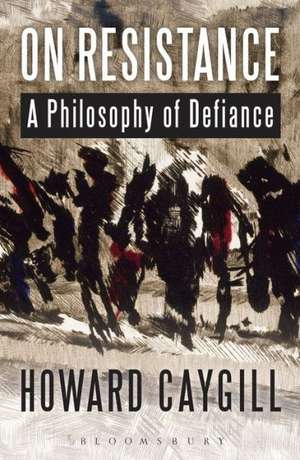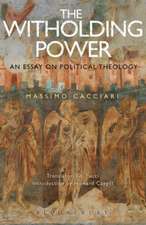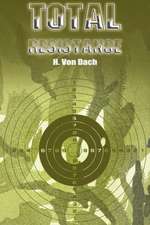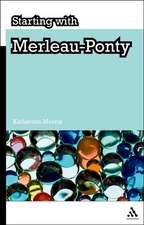On Resistance: A Philosophy of Defiance
Autor Howard Caygillen Limba Engleză Hardback – 23 oct 2013
| Toate formatele și edițiile | Preț | Express |
|---|---|---|
| Paperback (1) | 89.55 lei 6-8 săpt. | |
| Bloomsbury Publishing – 25 feb 2015 | 89.55 lei 6-8 săpt. | |
| Hardback (1) | 248.61 lei 3-5 săpt. | |
| Bloomsbury Publishing – 23 oct 2013 | 248.61 lei 3-5 săpt. |
Preț: 248.61 lei
Preț vechi: 386.14 lei
-36% Nou
Puncte Express: 373
Preț estimativ în valută:
47.58€ • 49.49$ • 39.28£
47.58€ • 49.49$ • 39.28£
Carte disponibilă
Livrare economică 25 martie-08 aprilie
Preluare comenzi: 021 569.72.76
Specificații
ISBN-13: 9781472522580
ISBN-10: 1472522583
Pagini: 264
Ilustrații: 1 illus
Dimensiuni: 129 x 198 x 23 mm
Greutate: 0.39 kg
Editura: Bloomsbury Publishing
Colecția Bloomsbury Academic
Locul publicării:London, United Kingdom
ISBN-10: 1472522583
Pagini: 264
Ilustrații: 1 illus
Dimensiuni: 129 x 198 x 23 mm
Greutate: 0.39 kg
Editura: Bloomsbury Publishing
Colecția Bloomsbury Academic
Locul publicării:London, United Kingdom
Caracteristici
Author is an internationally renowned philosopher capable of breaking entirely new philosophical ground
Notă biografică
Howard Caygill is Professor of Modern European Philosophy at Kingston University London, UK.
Cuprins
October 27 1960Introduction1. Conscious Resistance2. Violent Resistance3. Resistant Subjectivities4.Total Domination and the Capacity to Resist5.The Contemporary Capacity to Resist Outside the LawBibliographyIndex
Recenzii
There could not be a more timely moment for this book ... Acutely attuned to this context, which was unfolding as he wrote, the philosopher Howard Caygill offers a meditation on the history of resistance as idea and lived experience, a term which, as he states at the outset, is "strangely unanalysed" ... the book is wholly inspired by the spirit of resistance whose often unhappy trajectories it so brilliantly describes ... It is his unique mix of caution and enthusiasm, his avoidance of blind utopianism and of defeatism alike, which makes this book so important ... What kind of human being, On Resistance prompts us to ask, does resistance promote? Not only what do we want to achieve, but who do we want to be? ... On Resistance is as much an act as a philosophy of defiance. It will be indispensable for anyone thinking about resistance in our times, not least for demonstrating so profoundly that, for all its perils, resistance still possesses its "own necessities, its own affirmations and its own joy".
This is an extraordinarily rich book, and Caygill's selection of struggles and authors is both eclectic and erudite ... one of On Resistance's primary virtues is its sheer wealth of novel and surprising interpretations ... This is an excellent, interesting and provocative work, and is to be highly recommended.
Caygill assembles a constellation of diverse figures from a broad 'archive of resistance' and works through them in order to tease out an interpretation of resistance as a distinctive experience...This range of reference, along with the warmth of Caygill's evident sympathy with most of the many characters he considers, is enough to set this remarkable book apart from the great majority of recent philosophical reflections on our contemporary moment, most of which serve, one way or another, to help justify quiet acceptance of a version of the status quo. Though reluctant to return to openly revolutionary motifs (for reasons I'll address in a moment), Caygill's 'philosophy of defiance' marks a stirring and striking break with the prevailing philosophy of resignation.
The breadth of the study is striking, and the manner in which the author weaves together an array of philosophers, film makers and activists into a coherent narrative is compelling ... The text remains a fascinating and timely contribution that escapes the dangers of philosophy, remaining constantly aware of the practice of resistance.
Caygill offers a sophisticated account of a vast archive of practices and discourses on resistances which include among others figures like Marx, Lenin, Ghandi, Freud, Luxemburg, Mao and Fanon.
Howard Caygill's On Resistance is changing the landscape of how the concept of resistance is understood.
Whether engaging with Vaneigem's Revolution of Everyday Life, Clausewitz's On War ... or Kafka's Parable of the Law from The Trial, what we see, time and time again, is Caygill's ability as a reader come through as he dramatizes experiences, practices and concepts of resistance in a way that breathes new life into them for a contemporary audience. [...] This major work demands our respect and our attention ... An illuminating, engaging and richly detailed philosophical meditation on resistance ... [which] careful readers will find hard to resist
For the first time in over a generation an internationally acclaimed philosopher focuses his brilliance on re-thinking the very grammar of modern politics and war. A stunningly original re-reading of On War as On Resistance weaves Caygill's philosophically situated Clausewitz into a political reappraisal of the theory and practice of revolutionary and peoples' war, as well as anti-colonial struggle. There could be no timelier text for our newly revolutionary age. In exposing how the strategic interplay of resistance and counter-resistance continually outplays the dialectical, both philosophically and politically, Caygill's book asks profound questions of modern politics as much as it does of modern war. On Resistance is a classic.
A wonderfully philosophical perspective on what it means to resist
With his great and gorgeous intellectual generosity, Howard Caygill has charted the emergent politics of our time: resistance! Caygill constructs a constellation composed of concepts, ideas and arguments, but also of practices, histories, subjectivities, human capacities, artworks, movements and political debates that become a dark and dynamic account of who we are and what needs to be done. Stretching from Marx to Gandhi, from Freud to Pasolini, from Mao to the Women of Greenham Common, from Rosa Luxemburg to Jean Genet, from Fanon to the Zapatistas, Caygill exposes us to the elements for a different kind of philosophy, one that remembers, adumbrates and makes resistance possible. Scintillating, timely, and urgent.
This is an extraordinarily rich book, and Caygill's selection of struggles and authors is both eclectic and erudite ... one of On Resistance's primary virtues is its sheer wealth of novel and surprising interpretations ... This is an excellent, interesting and provocative work, and is to be highly recommended.
Caygill assembles a constellation of diverse figures from a broad 'archive of resistance' and works through them in order to tease out an interpretation of resistance as a distinctive experience...This range of reference, along with the warmth of Caygill's evident sympathy with most of the many characters he considers, is enough to set this remarkable book apart from the great majority of recent philosophical reflections on our contemporary moment, most of which serve, one way or another, to help justify quiet acceptance of a version of the status quo. Though reluctant to return to openly revolutionary motifs (for reasons I'll address in a moment), Caygill's 'philosophy of defiance' marks a stirring and striking break with the prevailing philosophy of resignation.
The breadth of the study is striking, and the manner in which the author weaves together an array of philosophers, film makers and activists into a coherent narrative is compelling ... The text remains a fascinating and timely contribution that escapes the dangers of philosophy, remaining constantly aware of the practice of resistance.
Caygill offers a sophisticated account of a vast archive of practices and discourses on resistances which include among others figures like Marx, Lenin, Ghandi, Freud, Luxemburg, Mao and Fanon.
Howard Caygill's On Resistance is changing the landscape of how the concept of resistance is understood.
Whether engaging with Vaneigem's Revolution of Everyday Life, Clausewitz's On War ... or Kafka's Parable of the Law from The Trial, what we see, time and time again, is Caygill's ability as a reader come through as he dramatizes experiences, practices and concepts of resistance in a way that breathes new life into them for a contemporary audience. [...] This major work demands our respect and our attention ... An illuminating, engaging and richly detailed philosophical meditation on resistance ... [which] careful readers will find hard to resist
For the first time in over a generation an internationally acclaimed philosopher focuses his brilliance on re-thinking the very grammar of modern politics and war. A stunningly original re-reading of On War as On Resistance weaves Caygill's philosophically situated Clausewitz into a political reappraisal of the theory and practice of revolutionary and peoples' war, as well as anti-colonial struggle. There could be no timelier text for our newly revolutionary age. In exposing how the strategic interplay of resistance and counter-resistance continually outplays the dialectical, both philosophically and politically, Caygill's book asks profound questions of modern politics as much as it does of modern war. On Resistance is a classic.
A wonderfully philosophical perspective on what it means to resist
With his great and gorgeous intellectual generosity, Howard Caygill has charted the emergent politics of our time: resistance! Caygill constructs a constellation composed of concepts, ideas and arguments, but also of practices, histories, subjectivities, human capacities, artworks, movements and political debates that become a dark and dynamic account of who we are and what needs to be done. Stretching from Marx to Gandhi, from Freud to Pasolini, from Mao to the Women of Greenham Common, from Rosa Luxemburg to Jean Genet, from Fanon to the Zapatistas, Caygill exposes us to the elements for a different kind of philosophy, one that remembers, adumbrates and makes resistance possible. Scintillating, timely, and urgent.


















